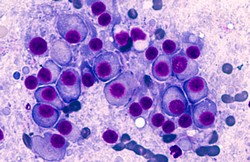Risk factors of multiple myeloma
MGUS is a premalignant asymptomatic condition where an individual has an abnormal immunoglobulin fragment known as myeloma or M-protein. The M-protein is indicative of abnormal plasma cell proliferation, a prominent characteristic of multiple myeloma. MGUS precedes all cases of multiple myeloma but not all MGUS patients progress to develop the malignancy. However, there are no methods predictive of MGUS outcome and progression to multiple myeloma. Accumulating evidence underscores the clinical problem of thrombosis among multiple myeloma patients. Interestingly, individuals with MGUS have an increased risk of both venous and arterial thrombosis but the mechanism is currently unknown. The EU-funded MGUS PROGNOSIS project analysed the morbidity and mortality among individuals with and without MGUS in the AGES-Reykjavik longitudinal cohort study comprising over 5 700 elderly men and women. Initially, all participants were screened for the presence of the M-protein and then specific outcomes of patients with or without MGUS such as survival, thrombosis, malignant progression and obesity were compared. Additional analyses were performed to estimate the risk of cardiovascular disease, alongside associations with diet and bone disease. Results showed that 5.3 % of the tested population had MGUS and 0.6 % had light chain MGUS. Overall, MGUS patients presented with inferior survival compared to non-MGUS individuals, while no association was observed with obesity and an increased risk of MGUS. However, obesity was found to increase the risk of malignant progression in MGUS individuals. Furthermore, study findings suggested that high adherence to the traditional Icelandic diet that includes salted/smoked meat and fish, blood or liver sausage, rye bread, and milk decreased the risk of MGUS later in life. Similarly, adherence to a diet high in fruit and vegetables decreased the risk of light chain MGUS. Collectively, the project provided important information on potential risk factors for MGUS and multiple myeloma development. These have laid the foundation towards the identification of high risk patients in the nation-wide screening iStopMM study that covers nearly 50 % of the Icelandic population.
Keywords
Risk factor, multiple myeloma, MGUS, MGUS PROGNOSIS, obesity

